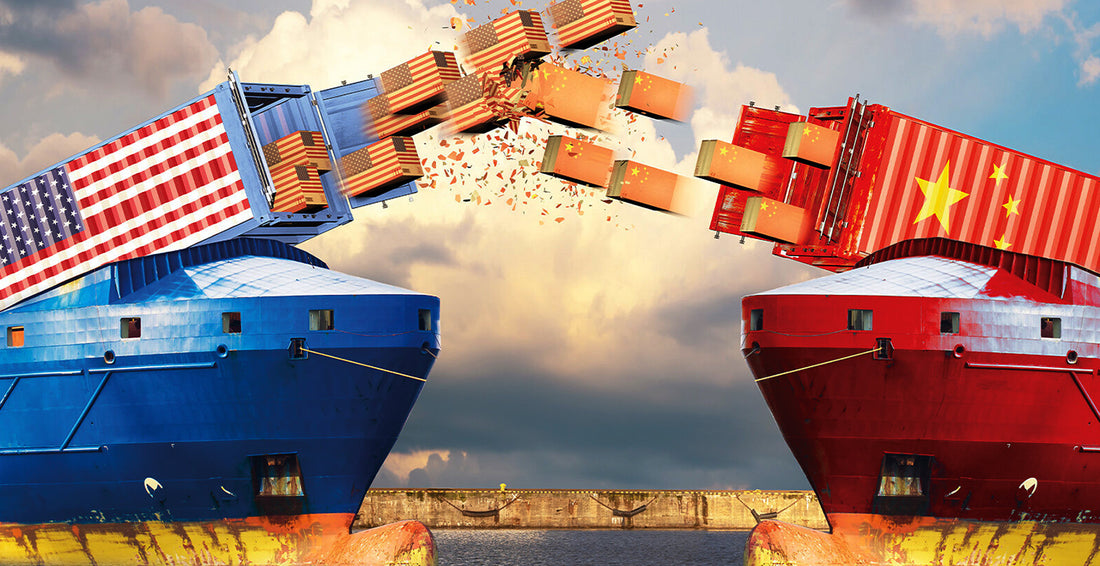
Small Business Owner Calls Out Unintended Consequences of Trump’s Tariff Wars
San Diego businessman and wine entrepreneur, Greg Martellotto, recently spoke out against the tariff wars, including the proposed 100% on European wine currently under review by the Trump administration.
Greg is concerned about the unintended consequences that are not discussed and tend to be invisible. The proposal will have dire consequences for both European and U.S. wine industries, hitting American small businesses and consumers especially hard.
“They’re trying to punish the French and Chinese for something that clearly has nothing to do with wine. And who’s paying the bill? Me! American small businesses. No one’s talking about it, no one that I’m aware of,” says Greg. “These things don’t seem to be well thought out. It doesn’t make sense.”

Recent Tariff War Actions and Escalations
- 5/10/2019: U.S. increased tariff rates on $200 billion of Chinese imports from 10% to 25%, an escalation of ongoing trade tensions with China.
- 6/1/2019: China increased tariffs on American wine from 48% to 93%.
- 7/11/2019: French-imposed levy of 3% on gross revenues for digital services of U.S. tech giants.
- 9/1/2019: China increased tariffs by 5-10% on one-third of American imports. U.S. retaliated with an additional 15% tariff on $112 billion of Chinese imports.
- 10/19/2019: U.S. levied 25% tariff on wines from France, Spain, Germany, and the U.K.. Did not include sparkling wines, wines over 14 percent alcohol, or large-format bottles. Was a reaction to the Airbus subsidy dispute.
- 12/2/2019: U.S. threatened tariffs of up to 100% on $2.4B of French goods, including Champagne, as a reaction to the French digital services tax.
- 12/11/2019: U.S. announced expansion of the proposed 100% tariffs to include ALL E.U. wines. Action related to the Airbus dispute and to keep pressure on the digital services dispute.
- 1/13/2020: Cutoff date in the U.S. for public comments on the proposed 100% tariffs.
Tariff War Impact and Unintended Consequences
Tariffs are intended to punish Europe and China for trade practices, but have nothing to do with wine. Depending on how long these taxes are in place, below are some of the unintended consequences for the wine industry:

U.S. - France/E.U.:
- As of October 18, 2019, many European wines became 25% more expensive in the U.S. Suppliers, importers, and customers bear the costs. The result was lower margins for producers and importers and somewhat higher prices for consumers.
- If tariffs rise to 100%, prices will double for everyone in the supply chain, putting European wines out of reach for most U.S. consumers. Some importers and retailers, mostly small businesses, will suffer from lower sales, and some may go out of business.
- Most consumers and businesses will be priced out of the world’s most famous wine regions. They won’t be able to afford to drink or serve what they desire.
- Many restaurants across the U.S. may have to change their wine lists. Those focused on European cuisine (Italian, French, Spanish, etc.) will have to serve wines from other countries.
- Domestic wine production cannot completely replace the loss of European wines, so substituting California for European wines is, at best, only a partial solution.
- California and European wines have very different profiles, so again, replacements are limited. Wines from other countries may partially replace those at lower price levels.
- European suppliers and exporters might lose their largest market, potentially devastating the industry there. Shifting to other markets will take time, but the U.S. is a significant market that has long-standing and deep relationships with Europe.
U.S. - China:
- China has recently been the fastest-growing market for California wines. As a result of 93% tariffs, Chinese demand for California wine fell dramatically in 2019.
- California may lose a vital customer whom the trade spent 20 years building a relationship.
- Most California wineries use wine bottles made in China. These bottles are now subject to an 18-21% tariff, raising production costs. Chinese suppliers pass on 100% of all tariffs to their customers.
- Wineries may have to find alternative suppliers, if the timing of bottling allows. Chinese glass producers will lose customers.
- Domestic glass is not a ready alternative due to higher local costs and limited supply.
- Such price increases impact smaller wineries significantly. They may not have the financial resources to survive.

American Small Business: Not the Target, but the Side Effect
Current tariffs relate to U.S. global corporations such as Boeing, Google, Apple, Amazon, and Facebook. These are companies with bottomless pockets. No matter the eventual outcome, they will survive.
No one in the wine trade is exempt from some impact:
- wineries
- wine importers
- wine distributors/wholesalers
- wine retailers
- bars and restaurants
- other wine companies that feature European wine or use Chinese suppliers
- U.S. wine drinkers
Both large and small businesses will suffer some level of negative impact from tariffs. However, the unintended consequences for small companies, including those in the wine trade, may ultimately be unsustainable. Even if the tariffs are short-lived, the consequences might not be.
The U.S. wine industry is a vast, national economic engine employing thousands that could lose billions of dollars and thousands of jobs. The wine business in the U.S. will likely contract.
As tariffs continue, Europe will look for new markets and U.S. consumers will be forced to change habits. The U.S. wine industry will suffer permanent damage, changing the very nature of the wine business globally.
Instead of a growing and robust wine trade between the U.S. and China, China will shift supply to other countries with more favorable trading terms. Chile, New Zealand, and Australia are gaining market share in China at California’s expense.
Back to our small-business owner, Greg asks, “Why am I paying more to import wine because Airbus is getting subsidies? Why should U.S. consumers pay more for European wine and other products?”
If politicians don’t consider the impact of tariffs on small companies, many will go out of business, taking jobs and economic prosperity with them.
NOTE: On Monday, January 20, 2020, an apparent agreement occurred between Donald Trump and Emanuel Macon to temporarily freeze mutually proposed tariffs related to the digital tax dispute. However, no details were released and the impact for the wine industry is unknown. There was no word about tariffs related to the ongoing Airbus dispute.






